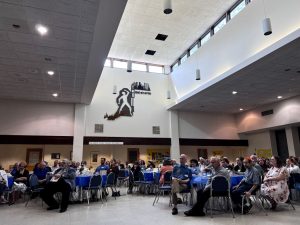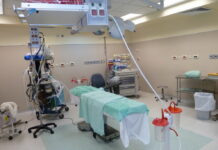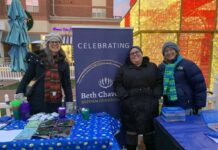
Before Kehilat Shalom opened in 1971, Gaithersburg was still, as its Wikipedia pages describes it, “a rural farm town.” But after a period of construction that transformed the town into a city with almost 70,000 residents, Gaithersburg became a place to be, and so did its Conservative synagogue.
Today, both the residents and the synagogue are still here, and on May 21 at Kehilat’s home on Apple Ridge Road, congregants celebrated the community’s 50th anniversary. Well, 50 plus two.
“Plus two” was not just an add on to account for the years the congregation could not celebrate its 50th anniversary due to COVID. It also signified survival after the pandemic, Rabbi Charles Arian said.
“We’re celebrating the fact that we’re still here,” he added.
Kehilat Shalom’s membership skews older, according to the rabbi. Since the start of the pandemic in March 2020, those empty nesters have been “extremely cautious” about returning to in-person activities. For high holiday and Shabbat services, Kehilat Shalom offered an online option. During the last two high holiday seasons, more members attended services on Zoom than in the sanctuary.
But through it all, they still came. And on May 21, they came back out. Arian estimated that two thirds of congregants and more than 100 people attended the anniversary party. Former members were there as well, and Arian’s predecessor, Rabbi Mark Raphael, was honored as rabbi emeritus. Raphael retired in 2012 after 16 years. Arian replaced him that same year.
“The shul doesn’t have two thirds of our members come to anything but high holidays,” Arian said. “I do think that people are looking for an opportunity to celebrate, to see people they haven’t seen in person for a while. This is a purely social occasion.”
And it was a fun one at that. There was music and food, as well as speeches from former members about the earliest days of the congregation.
Allen Katz, a member since 1984 and the immediate past president, called the event “nostalgic” and said it was nice to just “enjoy the moment.”
“It was great seeing everybody,” he added.
For the longtime congregant, the ceremony for Raphael was particularly emotional. He described it as “teary.”
“He’s really a mensch,” Katz said of Raphael.

But while the night may have been about honoring the former spiritual leader, it was a testament to the current one’s steady leadership, according to Katz. After COVID broke out, Arian had the “technical knowledge and technical insight to put us on Zoom,” Katz explained. The rabbi did the same with board of director meetings and other synagogue activities.
“And we were able to keep going,” Katz said.
Laurie Weker Lipton, a congregant since 2019 and the vice president of development, came up with the idea for the event and “spearheaded the effort,” said Arian. As Lipton explained, in planning the party, “we would start and stop and start and stop.” COVID kept getting in the way.
But as the pandemic subsided, synagogue leaders were finally able to put it on the schedule and follow through. And once it ended, Lipton felt relieved. But she did allow herself to relax a little and enjoy the night.
“You could see people reconnecting. A lot of hugs, a lot of handshakes. It was just a great day,” she said. “It was nice to sit down and talk. There’s nothing like face-to-face interaction. I think that’s the part I probably enjoyed the best.”
Arian attended college in the area in the late 1970s and remembers what he used to think of Gaithersburg.
“In 1977, my perception was that Gaithersburg was the end of the known universe. If you went further than Gaithersburg, you would fall off. In speaking to people who were here at the time, that’s what they heard from their coworkers,” he said.
“Starting a congregation in Gaithersburg in 1971, there was no guarantee that it would go anywhere. It was an act of faith and of optimism,” he added.
And so is restarting a congregation with an older group after a pandemic.
“I don’t know what the future holds but I’m certainly hopeful,” the rabbi said.





